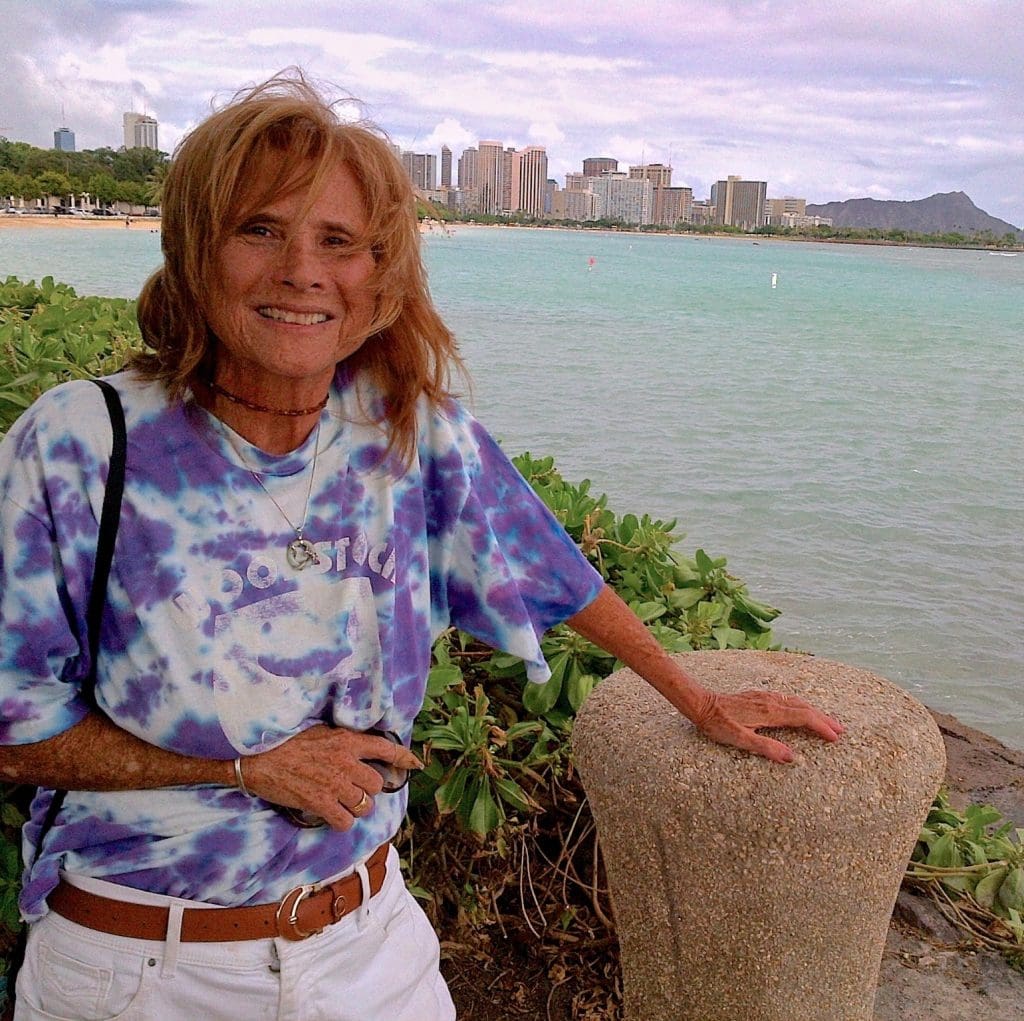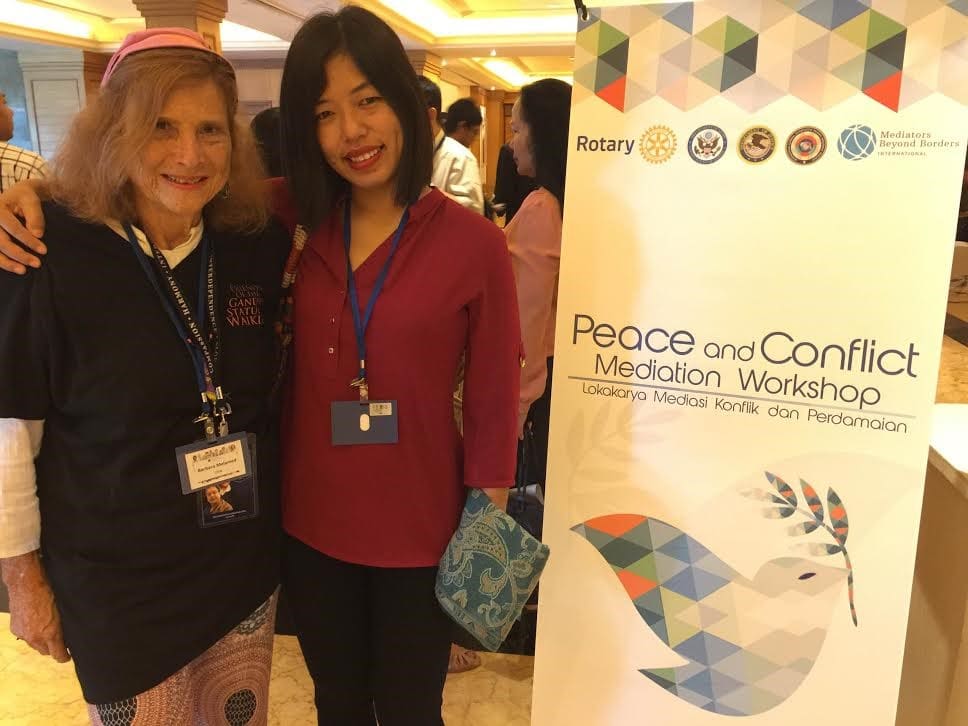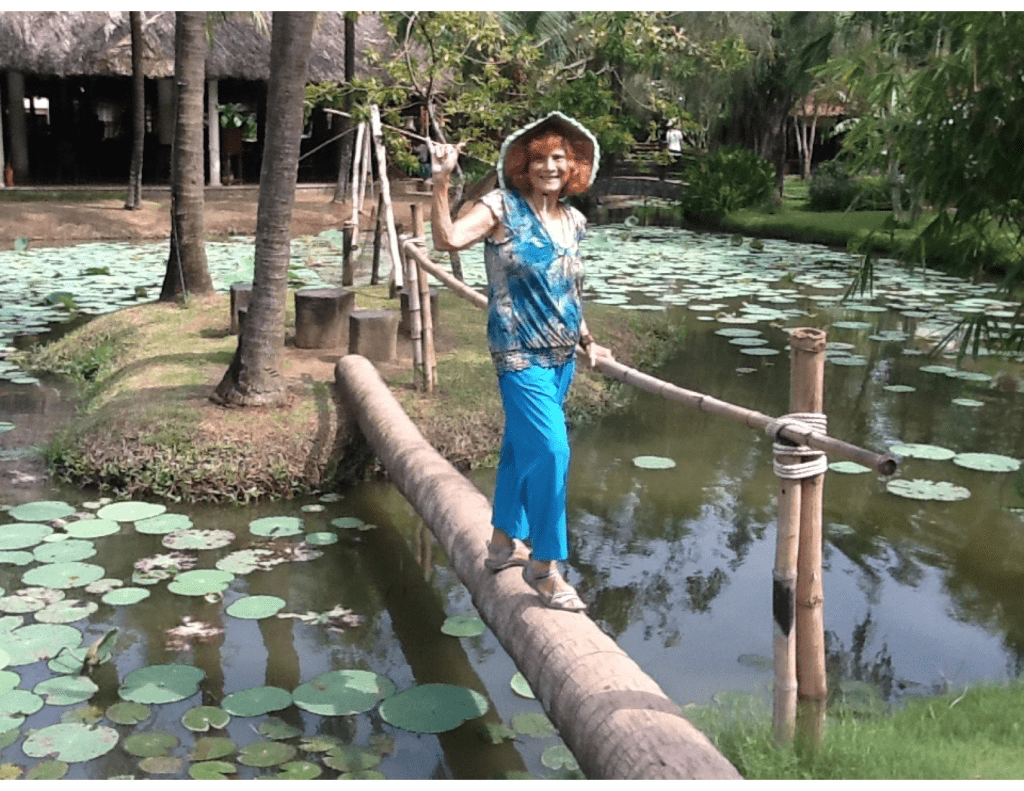Member Spotlight: Barbara G. Melamed, Ph.D. ABPP
Lauren Atherton (LA) MBBI Writer, interviewed Barbara Melamed (BM), on 10 August 2016

Barbara Melamed in Hawaii
Barbara Melamed is a Brooklyn-born, clinical psychologist and mediator. Barbara lives in Hawaii with her husband and son, Alex, who they adopted as a two year-old from a Russian orphanage. She has fully embraced the Hawaiian community spirit and local mantras–in addition to her favourite Gandhi quote, “be the change you want to see in the world” – to guide her through life and her mediation career. She has been an MBBI member for three years and is passionate about expanding the MBBI family. Just as she fosters her son Piseth Sam, from the Future Light Orphanage in Cambodia, she hopes that we can all ‘foster’ and mentor those in our MBBI family.
LA: You recently attended MBBI’s International Training Institute (ITI). Could you explain what that is for our readers?
BM: MBBI’s ITI trains participants, men and women, for women’s peacebuilding. I have participated in ITIs for the past two years, in Bucharest, Romania (2015) and now, thanks to Rotarian support, in Jakarta, Indonesia (2016) looking at the world around us and trying to figure out why we can’t find peaceful solutions to conflicts.
Thanks to the training, we were able to provide the skills that enabled 300+ Indonesians to handle their own turmoil. People who were trained included government workers, members of the police force, abuse counsellors, social workers and victims, each diverse group had the task of defining peace in families and in the community. It was an amazing experience to feel the energy in the room!
Those at the ITI became family and I had such a wonderful experience. I’d like to thank the leaders teaching us during the 5 days—they put their heart and soul into it. The trainers gave us the tools to work through our uncertainties and know that even with our imperfections we could do good for others. They created in us the power to self-examine, even allowing us to own our anxieties. I must give credit to the Rotarian participants, especially those who made time for fun, by sharing of their culture through dance and song.
Aloha means sending and receiving a positive energy and living in harmony. When you live the spirit of aloha, you create positive feelings and thoughts, which are never gone. They exist in space, multiply and spread over to others. MBBI’s ITIs certainly encapsulate the meaning of aloha!

Barbara Melamed at ITI 2016
LA: What did you take from your experience at this year’s ITI?
BM: What I learned in Jakarta is you don’t have to be in Hawaii to share the spirit of learning, giving and receiving. Parting with my new brothers and sisters was difficult, but many of our projects did come to fruition; and the idea that we will retain group support over the next months and even years gives the bigger picture of what it means to be a mediator beyond borders. We support each other undertaking difficult projects in our home countries.
My participation made a real difference for me. I went back and started new conversations about how to resolve a territorial and spiritual conflict in my own Hawaiian islands. There is a thirty-meter telescope planned to be constructed with the collaboration of China, Japan, France, India and Canada on Native Hawaiians’ spiritual mountain, the Mauna Kea “Sky Father”—spiritual owner of the mountain. Yet, we need to respect that this mountain is also a spiritual home for Native Hawaiians and a place for performing rituals and prayers. Respecting indigenous needs requires inclusive collaboration to achieve a successful common ground. EnvisionMaunakea.org is looking at inclusive problem-solving. We need patience, hopefulness and persistence to achieve viable lasting outcomes.
As Peter S. Adler (padler@hawaii.edu) notes, “The issue is currently tied up in litigation, hard lines have been draw in the sand by some Native Hawaiians, and thus far there is no evidence that meaningful negotiations have occurred. Opportunities for community dialogue have opened up but the final result of the litigation may be determinative of the future for both astronomers and Native Hawaiians.” At this time there are aha (public meetings) to allow each person, Native Hawaiian or any other kama’aina (people living in Hawaii) to express their opinions. They provide new ideas such as special fellowships for Native Hawaiians studying astronomy, spiritual sites designated only for Native Hawaiian ceremonial worship, and removing obsolete telescopes from the mountain. The Big Island already has a visitors’ center, but perhaps could be more historical about the Hawaiian traditions, contributions and culture. EnVisionMaunakea.org is one approach. This shows that persistence and patience are essential.
LA: Who should join MBBI and why?
BM: We need younger individuals and elders who believe that “peacebuilding is teachable,”says Maya Soetoro-Ng, who was one of the founders of ceedsofpeace.com. This Hawaiian organization supports and builds bridges between families, community leaders and educators to share resources and develop action plans to strengthen our communities and improve our children’s lives. The Ceeeds to be planted are: Critical Thinking, Courage, Compassion, Conflict Resolution, Commitment, Collaboration, Community. MBBI could incorporate this model, focusing on the roots of the issue; teaching children to respect and love one another for their differences—and learn that cooperation brings more fun and better relationships to grow upward and onward . This empowers individuals to commit to being the change they want to see in the world. In Hawaii, we have the phrase, Ohana which means family—which can be done with anyone! At the ITI in Indonesia, it was like an MBBI family and if I were to suggest a change to MBBI it would be to incorporate the spirit of ohana into the organizational structure. We could have a Junior MBBI, for example; and create families; joining like-minded mediators together in small groups to provide support in each members’ endeavours.
LA: How did you move to include mediation as important to your competence in clinical psychology ?
BM: When I moved to Hawaii I realized I was dissatisfied with psychology and the way psychologists relate to patients by stigmatizing and often depriving them of solving and taking possession of their own solutions. I didn’t know enough about the people I served – my patients, or as I like to call them, my clients – had the skills to solve their own problems. So, at age 69, with the mess the world was in, I took a Graduate Certificate at the University of Hawaii Matsunaga Institute for Peace and Conflict Resolution. There I met some awesome mediators who are my role models of how to succeed in bringing peace to a complex situation. Parties need to comprehend and respect cultural differences in order to achieve common ground. They learn to understand and compromise so that warmth and comfort can be attained in fulfilling one another’s aspirations. I embraced “we shall overcome” as a teenager when I participated at Camp Brotherhood with Pete Seeger and the civil rights activists. As a young student with Students for Nonviolent Coordinating Committee, and sitting-in to integrate Woolworth’s “white only” counter, so my friends no matter what their color or ethnicity could also be served, this lifelong mantra was established.

“Life is a balancing act…keep on moving”.
LA: What have you learned since moving from psychology to mediation?
BM: Being a mediator has made me realize the importance of putting oneself in other people’s shoes. Mediation suits me much more than psychology—instead of diagnosing people by finding weaknesses and helping individuals find a solution for themselves, I am learning to listen and understand others’ feelings—and encourage them to find solutions that work for them. I have learned that the most sustainable solutions come from the persons who are experiencing the trouble, and that the best solution is the one that comes from the heart rather than the head.
LA: What moment of your mediation career has been the most meaningful?
BM: In 2001, living in New York, I started my job on Monday 9/10 at Mercy College (a Hispanic Serving College) and we watched the horror unfold on Tuesday— 9/11. It is hard to believe it is fifteen years since the world and my city changed. When 9/11 happened, some of our psychologists colluded with the CIA on enhanced interrogations in an attempt to find out about terrorism. From then until late as last year, The American Psychology Association’s ethics provided a loophole by which psychologist were OK to stand by in interrogations at Guantanamo Bay and other torture sites. Many, including myself, were unhappy with this as it was unethical as these were political prisoners denied access to a trial in violation of the International Covenant on Civil and Political Rights (ICCPR), which the US has ratified.
I helped mediate a consensual decision of APA 1 “Do No Harm Psychology” 14 years too late, to retire our CEO and the ethics personnel who enabled psychologists to stand by while political captives were being interrogated with torture techniques including water boarding , food and sleep deprivation. I was a contributing force to turning this ethics policy around. This was achieved through mediation following an outside independent report, paid for by the APA, which included interviews with persons on all sides and set history straight. Thus, our Council Members voted close to unanimously to change the ethics statutes…and presented this to all of the members of the association at our Annual Convention held in Toronto, Canada in 2015.
Another meaningful moment of my mediation careers was as I did volunteer work at a children’s camp in Croatia— sponsored by a Hawaiian NGO Global Children’s Organization. It was a time of war in Yugoslavia and the Muslims, Croatians and Serbians were killing one-another. We allowed children, who were without parents, to deal with the issues using they were feeling through drama, video and Tai Chi to show the things that were most important to them. I saw them cluster into little hanai (Hawaiian word for unrelated members who become like family). This reminded me that family is basic to feeling empowered and much of my mediation work has been facilitated by knowing the importance of having that basic trust, security and love coming from “family sense.” Much of the principles of mediation require, listening, empathizing, compromising in service of solutions which are sustainable because stakeholders may not get everything they want, however recognition of positions and needs allows resolutions to be achieved, revised, and tailored to work for all parties.
LA: Why do you think mediation is important in today’s fractured and multi-actor conflict environments?
BM: “An eye for an eye makes the whole world blind,” Gandhi said. Instead of that, each person’s wants and needs must be addressed and listened to. I have also worked with our soldiers and our veterans of the Vietnam era at an acute care Veterans Administration Hospital, as well as more recently at Tripler Army Medical Center in Honolulu, where I worked not only with those deployed but their families The soldiers and veterans suffer a combination of PTSD, Traumatic Brain Injury, Depression and Pain. The Veteran’s Association states 20 veterans commit suicide every day. It’s probably higher since alcoholism and medication deaths are rarely designated as suicides. Soldier’s and veteran’s children are especially proud of their parents service, but they miss something due to their parent’s absence. Behavior problems show up in school and sometimes in aggression towards other children. One deployed woman soldier shared with me that on Mother’s Day her 9 year-old son sent her a card with her obituary. War is not a choice we should have to make to resolve conflicts. At the moment it seems guns are the only way to end disputes, however it’s a permanent solution with no winners. Mediation listens, it takes context and cultural differences into account. Mediation compromises and ensures both parties can live with shared outcomes and come back to the table when things need to be updated.
LA: What are the key characteristics a mediator must display to achieve their desired outcome?
BM: A good mediator has knowledge of how to gain an understanding of each parties concerns, conflicts weaknesses and strengths, and inclusive of all cultural, religious and affiliative differences. A good mediator listens to their needs, wants and willingness to forfeit some of their own preferences to restore peace. A good mediator needs to be patient but persistent, don’t give up when the going gets tough; sustainable mediations take time!
LA: How do you work as a mediator to achieve results?
BM: First I study hard beforehand and understand what each side desires as a solution, I understand what it is based on and how their culture and background influences their problem- solving ability. I start with easy problems that can demonstrate solutions which are acceptable and appreciated. All parties tell of what they want and why they want it and what they are willing to give up to get it. Once this is discussed there is a common core of solutions. It shows parties how compromise is a way to achieve results without disharmony. The next step is to define the issues for clarity, this builds a better working relationship between the parties and makes it more likely that honest communication occurs, improved fact-finding becomes possible, and the negotiation has a better chance of yielding long term solutions. This gives the parties the template for solving their own problems in the future. We now have produced a Trauma Informed Peacebuilding Curriculum to help indigenous leaders in their endeavour to maintain healthy lifestyles recovering from atrocities and creating a new generation who love and embrace peace.
LA: What question would you like to ask the next MBBI Spotlight interviewee?
BM: How can we get younger individuals excited to join our collaboration for peace?
I would like to end this interview by quoting one of my earliest and most admired colleague, Anthony J. Marsella, Ph.D., Professor Emeritus at University of Hawaii:
“Show, by your actions, that you choose peace over war, freedom over oppression, voice over silence, service over self-interest, respect over advantage, courage over fear, cooperation over competition, action over passivity, diversity over uniformity, and justice over all.”
Contact: Barbara@drmelamed.net
Responses have been shortened for clarity
